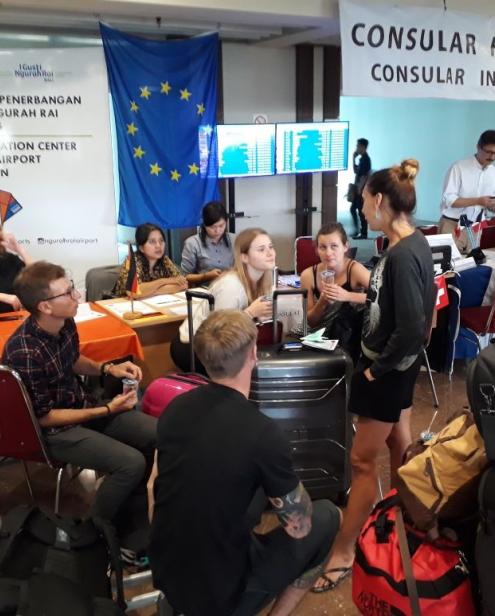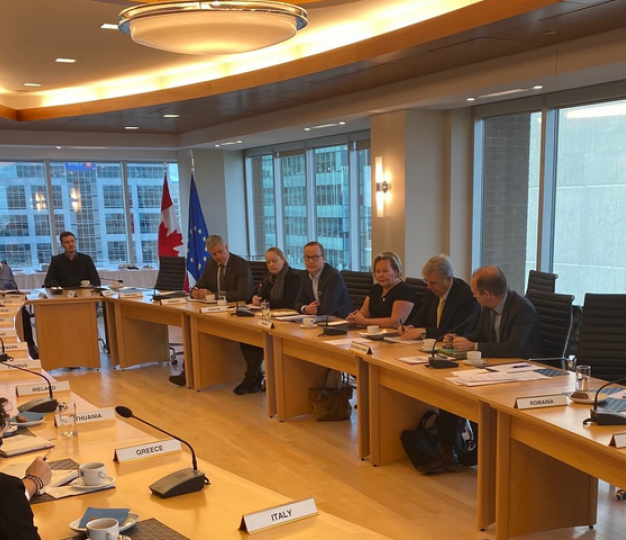Consular protection for EU citizens
Did you know that consular protection is one of the fundamental rights of EU citizens, associated with EU citizenship?
Tips for safely travelling abroad
Before you travel, here are some simple tips for safer travel and for making consular protection more effective:
- Have a look and follow the travel advice and instructions available on your country's Ministry of Foreign Affairs website. Follow the link to the page on Travel Advice.
- Always ensure that you are registered with your Ministry for Foreign Affairs before travelling, if your country offers such a platform. This will make it easier for your Ministry to inform and support you should a crisis or an accident happen.
- Make sure you have a copy of your travel documents (ID card and/or passport) accessible to you in print and/or in digital format. Check your passport/document expiration dates! Some countries require that the passport expiration date is at least six months away.
- Before travelling, check if your country has an embassy or a consulate in the country you are travelling to. If it is not present, look for an embassy or a consulate of another EU Member State. You may consult the EU Delegation’s or the European Commission’s websites. Follow the link to find a page with information about EU Embassy/Consulates
- Keep a list of emergency contacts ready, including contact details of a relevant consulate/embassy. For more details, follow the link to page called EU in the World.
- Subscribe to a travel insurance before you travel
- Be informed of local emergency services’ contact details and local information sources.
💡 Did you know: for the EU’s two Commonwealth countries, Cyprus and Malta, embassies based in fellow Commonwealth countries such as Canada, Ghana and India, are known as high commissions. Whereas, consulates remain known as consulates.
Consular protection of EU citizens
Consular protection refers to the support and assistance, which a country offers to its citizens who are living or travelling outside their home country when they encounter difficulties or require help. Consular protection is typically offered in situations such as:
- Loss of travel documents
- Serious accident or illness
- Relief and repatriation in case of an emergency
- Becoming a victim of crime
- Arrest or detention
- Death
The responsibility to provide consular assistance to EU citizens lies with the individual EU Member States. However, not every EU Member State has embassies or consulates in every country of the world. This means that some EU citizens are ‘unrepresented’, with no embassy or consulate from their own Member State to help them. So what happens if these citizens need assistance?
In such cases, ‘unrepresented’ EU citizens have the right to seek help from the embassy or consulate of any other EU Member State present in that country. The other EU Member State must assist ‘unrepresented’ EU citizens under the same conditions as they would to their own nationals. This mutual assistance is particularly important in case of a consular crisis.
From an EU perspective, a consular crisis arises when the life, health or security of a large number of EU citizens in a third country is at risk – such as during natural disasters, major accidents, or periods of political instability.
To strengthen and facilitate the right to consular protection, in 2015, the Council adopted Directive 2015/637, known as the ‘Consular Protection Directive’. This Directive promotes greater cooperation and coordination among consular authorities across the EU.
Further enhancing these rights, in 2019, the Council adopted Directive 2019/997 establishing an EU Emergency Travel Document. The Directive complements the Consular Protection Directive by making it easier for unrepresented citizens to obtain an emergency travel document from another EU Member State, enabling them to return home when in case of loss of passport or other cases. Read more about the EU Emergency Travel Document below.
- For more on the right to consular protection for EU citizens, read EU Consular Protection Rights explained.
The work of the EEAS, including EU Delegations
In line with the Consular Protection Directive, the European External Action Service (EEAS) and its global network of EU Delegations play a central role in upholding EU citizens’ right to consular protection in close cooperation with EU Member States.
In particular, the EEAS and its EU Delegations facilitate coordinated EU efforts on consular crisis preparedness and response, both on the ground in third countries and between EU capitals.
In this context, the EEAS works closely with the European Commission – particularly DG ECHO-ERCC and DG JUST – as well as EU Member States (in particular national crisis centres), to ensure an effective and unified approach to consular matters. The EEAS supports the Council Presidency on consular matters, notably through active participation in the Council Working Party on Consular Affairs (COCON), which focuses on coordinating consular cooperation and contingency planning among Member States and the EEAS.
Beyond the EU, the EEAS maintains cooperation with non-EU countries and international organisations.
Visit the pages below for more information about consular protections.
What does this mean in practice?
Here are some examples of ways in which coordination and cooperation on consular matters between EU Member States and the EU has helped EU citizens.
Crisis Response in Sudan (April 2023):
- When conflict erupted in Sudan in April 2023, around 1 700 EU citizens were present in the country. To bring them out of harm’s way, EU solidarity was in full effect. Thanks to effective EU coordination, EU Member States leading evacuation operations took on board other EU citizens and also citizens from other continents. For more information, follow the link to read the article Joint EU-Spain efforts bring citizens out of Sudan and back to safety
International Events – FIFA World Cup 2022 in Qatar:
- Major international events can present unique consular challenges. During the 2022 FIFA World Cup in Qatar, the EU and its Member States worked together to ensure that EU fans could access assistance if needed - even if their home country did not have a local embassy. For more information, read the story Team Europe at play for EU citizens during the World Cup.
COVID-19 Repatriations (2020)
- When the COVID-19 pandemic led to sudden global travel restrictions in early 2020, more than 600 000 EU citizens found themselves stranded abroad. In response, the EU and its Member States quickly joined forces to coordinate large-scale repatriation efforts, successfully bringing citizens home. To learn more, watch the video called Coronavirus: EU citizens stranded abroad, an unprecedented repatriation effort.
EU Emergency Travel Document
EU citizens whose passport or travel document has been lost, stolen or destroyed in a country outside the EU where their own EU Member State does not have an embassy or consulate are entitled to receive an EU Emergency Travel Document from any other EU Member State located in that country.
The EU Emergency Travel Document is issued for a single journey to the holder’s EU Member State of nationality or residence, or exceptionally, to another destination (such as a neighbouring country with an embassy or consulate of the holder).
The EU Emergency Travel Document is valid for a bit longer than the period required for completion of the journey for which it is issued. Normally, the validity will not exceed 15 calendar days. Persons receiving an EU Emergency Travel Document are strongly encouraged to complete the journey as quickly as possible, to follow any advice given by the consulate or embassy regarding the best route, and to immediately apply for a normal travel document. The EU Emergency Travel Document must be returned after arrival at the final destination.
EU citizens in need of an EU Emergency Travel Document must apply at the embassy or consulate of an EU Member State. The EU Emergency Travel Document will be issued after a verification of the applicant’s nationality and identity by the unrepresented EU citizen’s Member State of nationality. In normal cases, the issuance should not take longer than seven working days.
Member States may also choose to issue the EU Emergency Travel Document to other persons, such as their own nationals or EU citizens’ family members who already live in the EU. If an EU Emergency Travel Document is issued to a person who is not an EU citizen, a visa may be necessary.
- Further reading



